Earlier this week, two men in a black Toyota Cruiser attacked a motorcade carrying Libyan Prime Minister Fayez Serraj, the head of the State Council Abdulrahman Sewehli, and the head of the Presidential Guard Najmi Nakoa. Two guards were reportedly injured as the gunmen opened fire. After the emergency ended, Abdulrahman Swehli pointed the finger at former Prime Minister Khalifa Ghwell and his self-declared, Tripoli-based Government of National Salvation, claiming they were behind the attack.
At around the same time, General Khalifa Haftar’s Libyan National Army (LNA) carried out additional airstrikes on the Al-Jufra Airbase against the Benghazi Defense Brigade (which is supposedly headquartered at the air base). Casualty numbers are still unknown.
The same day, the outbreak of heavy clashes between Zliten Joint Security Room militias and Al-Mahjoub brigade (part of Misrata militias) blocked the coastal road between Tripoli and Misrata. During the night, according to reports, militias—backed by the police and coast guard—were illegally shipping Libya’s oil to Europe in league with mafia groups.
All this occurred while Khemaies Jhinaoui (Tunisian foreign minister), Abdelkader Messahel (Algerian minister of Maghreb affairs, the African Union, and the Arab League), and Sameh Shoukry (Egyptian foreign minister) were in Tunisia signing an agreement for a comprehensive solution to the Libya problem, rejecting any foreign intervention or military solutions there. Their statement stressed the importance of keeping Libyan institutions united across the country.
That is, frankly, bizarre: both because Libya is hardly “united” in its current state, and because while outside parties can be helpful in supporting Libya during its transition, they should be careful to not over-insert themselves. After ISIS beheaded 21 Coptic Christian Egyptians in Libya in 2015, Egypt launched air strikes—a retaliation against ISIS, yes, but also a move that resulted in civilian deaths. These kinds of international interventions in Libya should not go unnoticed.
Libya then
Exactly 10 years ago, I was in Libya working on my book about the counterinsurgency campaign that the Royal Italian Army waged against the Libyan rebels. It was a tough, ruthless war that lasted almost 20 years—but no one apart from the Libyans (and a few Italians) knows much about it. In the end, the Italians won against the Bedouins, but the price paid by the population—especially nomad people of Cyrenaica—was very high. It was one of the few times that a Western army got the better of insurgent guerrilla warriors; a piece of forgotten history that would be useful to recall these days.
On my trip, I sought to study the terrain through which the Italians had moved throughout their military campaign: I went through a good part of Tripolitania, starting in Tripoli and passing by the white Ghadames, touching Ghat, sleeping in tents in the Akakus desert, and going across the path to Murzuk and Sebha to the wonderful Leptis Magna and Sabratha. That was during the dictatorship of Muammar Gadhafi, and although he was a tyrant—not to mention one of the most wicked—those areas were much more secure than they are today. Note: I’m not nostalgic for Gadhafi; to the contrary, I always criticized him and his way of ruling Libya. But I am a realist.
Libya now
Six years after its 2011 revolution, Libya is in a disastrous condition, closer and closer to collapse. And it’s undermining the already precarious balance of its neighbors Egypt, Tunisia, and Algeria, stretched thin by weak economies and by the passage of terrorist groups through porous borders.
When the leaders of those countries met earlier this week to design an action plan, they emphasized that Libya must maintain its sovereignty. That’s true, and in fact it is necessary for Libya’s neighbors themselves to abandon their own ambitions related to Libyan energy and oil.
They also said that the Libyan crisis can only be solved through a political solution. Also true, since military action can lead to very little at this point, and Libya’s civil war has already lasted too long.
Moreover, the ministers asked for no foreign intervention in Libya. Good idea. The intervention of foreign nations (Qatar, the United Arab Emirates, Russia, Egypt)—mostly in the form of weapons sales and other military assistance—has been deeply harmful to any potential peace process in Libya, as it has altered internal dynamics that would have otherwise determined outcomes. Political transitions, particularly to a democracy, are complex and often painful—but democracy is a critical part of that equation, and successful democracies are not imposed from the outside.
Finally, the ministers said Libya must remain united. Yes, but that’s not possible under current circumstances. There are no institutions, no central government, no united security forces; in other words, there is nothing that allows us speak of a “state” in the true sense of the term. The country must be rebuilt from the bottom, not from the top. Nor can it succeed if its tribal structure is abandoned—instead, differences must be respected. We must have the courage to admit that today, at least, Libya as a country does not exist.
Start from the bottom
Libya is still too immature, politically, to overcome the atavistic divisions among the people and tribes of what once were known as the historical regions of Cyrenaica, Tripolitania, and Fezzan. These divisions have impeded real leadership—in its absence, the international community must come in to help Libyans build from the bottom, in small steps. Rather than funnel money to militias, international actors should help fund roads, power plants, refineries, hospitals, and, above all, schools. Gadhafi purposely under-invested in developing Libyans’ minds and professional skills—instead of sending military advisers, international actors should support Libyans’ efforts to build a civil service. The Turks, Italians, and Gadhafi always used violence and an iron fist. That never truly succeeded, and to overcome this impasse now, a change of course is needed.
The Brookings Institution is committed to quality, independence, and impact.
We are supported by a diverse array of funders. In line with our values and policies, each Brookings publication represents the sole views of its author(s).

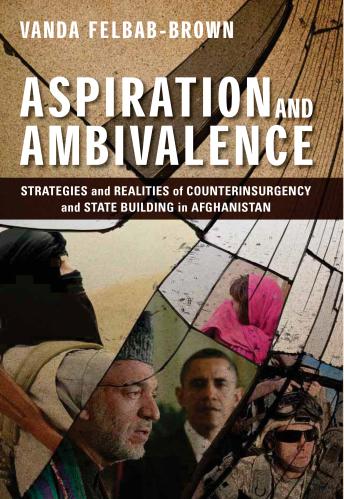


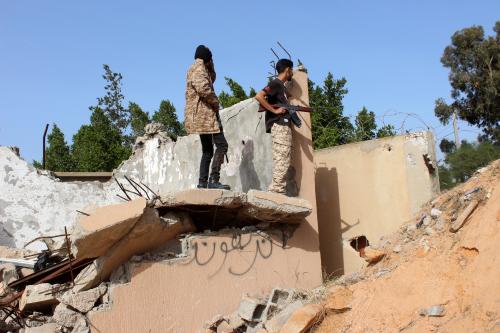
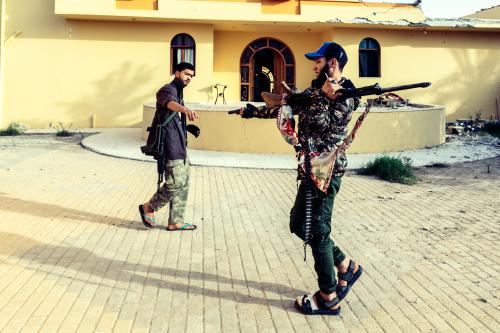
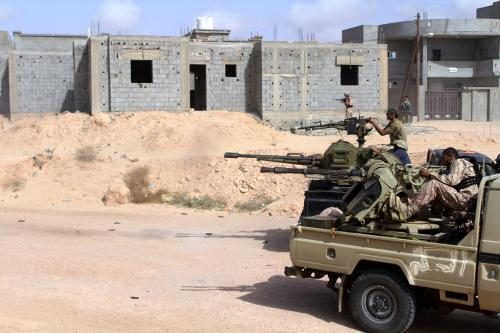

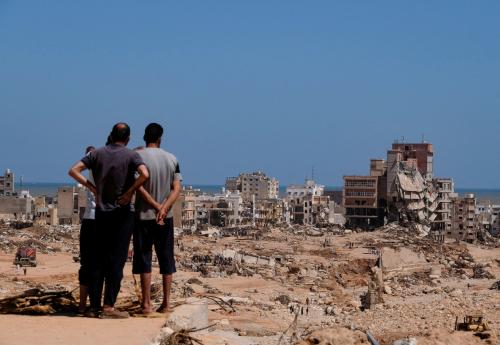

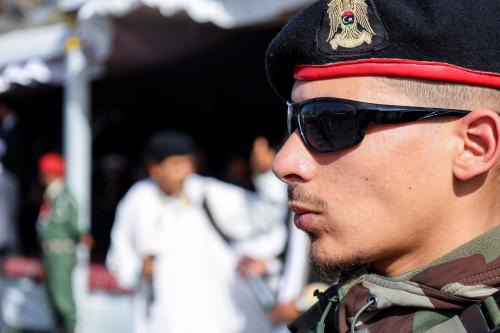
Commentary
Yes, Libya needs an international action plan—but a realistic one
February 24, 2017